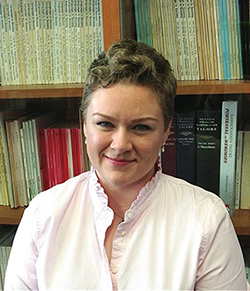News & Events
Tagore Passport Operating Scholarship awarded
$5,000 graduate studies scholarship honors Indian artist Tagore

Samantha Lay, a doctoral student in English and American Literature, has been awarded the third annual Tagore Passport Operating Scholarship.
The $5,000 scholarship is the gift of the Tagore Society of Houston, and is part of the partnership between the Tagore Society and the Department of English and its Creative Writing Program.
This competitive award is presented to a full-time graduate student at the University Houston based on a project that will advance our knowledge and understanding of the 1913 Nobel Laureate in Literature, Rabindranath Tagore.
Born in 1861 in Calcutta, Tagore authored many volumes of poetry including "Manasi (The Ideal One)," "Sonar Tari (The Golden Boat)," "Gitanjali (Song Offerings)," "Gitimalya (Garland of Songs)" and "Balaka (The Flight of Cranes)." He also wrote eight novels including "Chaturanga (Quartet)," "Shesher Kobita (The Last Poem)," "Char Adyhay (Four Chapters)" and "Noukadubi (The Boat Wreck)."

As a songwriter, Tagore composed more than 2,000 works. Later in life, he added painting to his repertoire and became a successful and prolific visual artist. In 1913, he was named the Nobel Laureate of Literature. He also is noted for his close friendship with Mohandas Gandhi, 20th century leader of India's independence movement.
This year’s recipient, Samantha Lay, will explore how Tagore’s vision of a borderless, transcultural society is part of a larger intellectual movement of Global Romanticism. She will pursue her research at the Visva-Bharati University and at the University of Kolkata in India.
Here’s an excerpt from Samantha Lay’s project proposal:
“As a student of Romanticism, my interest in Romantic ideologies is not limited to those in Great Britain. Nearly every country has had, or will have, its own Romantic period, and I will examine how Rabindranath Tagore’s literature initiates and defines India’s Romantic Movement.
“I want to be clear that I have no intention of comparing him to English Romantics. That would be a disservice to Tagore and to India. While many of the ideals will be quite similar, I will research how Tagore responds to a crisis in culture that is specific to India’s political, social, and economic climate.
“I will read Tagore’s letters and journals when he visited Dalhousie and Darjeeling. I will also walk in Tagore’s footsteps, doing physical research in the cultural and environmental climates that inspired his works.”